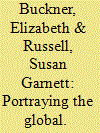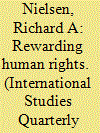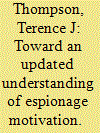|
|
|
Sort Order |
|
|
|
Items / Page
|
|
|
|
|
|
|
| Srl | Item |
| 1 |
ID:
126541


|
|
|
|
|
| Publication |
2013.
|
| Summary/Abstract |
Many have noted the rise of the global in academic and popular discourse. We ask how this global frame of reference has been incorporated into secondary social science textbooks, a realm traditionally dominated by nationalist discourse. Utilizing a data set from more than 500 secondary school textbooks from around the world, spanning 1970-2008, we describe the incorporation of mentions of globalization and global citizenship into textbooks over time and then use a multilevel model to determine the textbook and country-level variables associated with mentions of each. We find that globalization and global citizenship are both predicted by the textbook content's reflection of the external world, including international events and mentions of human rights. However, no cross-national economic or political differences systematically predict incorporation of these topics. We argue that mentions of globalization and global citizenship in textbooks are two manifestations of a world culture that increasingly emphasizes interconnectedness in postnational society
|
|
|
|
|
|
|
|
|
|
|
|
|
|
|
|
| 2 |
ID:
126579


|
|
|
|
|
| Publication |
2013.
|
| Summary/Abstract |
This article provides theoretical and empirical solutions to two connected puzzles in the study of foreign aid and human rights: Do foreign aid donors use aid sanctions to punish repressive states, and if so, why? I show that donors impose aid sanctions selectively. Aid sanctions typically occur when repressive states do not have close political ties to aid donors, when violations have negative consequences for donors and when violations are widely publicized. Using a data set of bilateral foreign aid to 118 developing countries between 1981 and 2004, I find that variation in these factors largely accounts for the differing aid sanctions that result from objectively similar rights violations by the governments of developing countries.
|
|
|
|
|
|
|
|
|
|
|
|
|
|
|
|
| 3 |
ID:
130228


|
|
|
|
|
| Publication |
2014.
|
| Summary/Abstract |
The case of Edward Snowden, who in May 2013 revealed a huge number of National Security Agency codes, has again raised the question of motivation in espionage and disclosure of documents.
Espionage is a crime with complex, multi-faceted motivational factors that do not lend themselves to easy explanation. Most cases present a singular mosaic of intersecting psychosocial forces which culminate in a decision to engage in the crime. Espionage is committed by individuals from the lower middle to upper middle classes; unlike street crime, it is rarely, if ever, committed by the poor. What drives people of middle class privilege to choose to commit such a heinous crime?
The current model, postulated by numerous scholars and simplified here, holds that espionage occurs at the collision of an opportunity, a perceived life crisis, and a moral failing, which is then actuated by a trigger. 1 The spy must have an opportunity, which usually translates into access to information or a person. Access to information is typically gained through the holding of a security clearance. Such a trusted insider has minimally restrained access to classified information, and that access is usually defined by position. A senior scientist working on satellite systems obviously has significant access to classified satellite data but may have almost no access to human intelligence (HUMINT)-and vice versa. Conversely, and perhaps surprisingly, according to one study, 25 percent of known spies since World War II have held no security clearance. 2 These spies usually acted in concert with another individual (often a spouse or lover), or simply knew someone who did have access. This was the case in the Boyce-Lee case in California wherein Christopher Boyce held a security clearance and Dalton Lee did not. 3 Access, however derived, represents the most common opportunity to commit espionage.
|
|
|
|
|
|
|
|
|
|
|
|
|
|
|
|
|
|
|
|
|